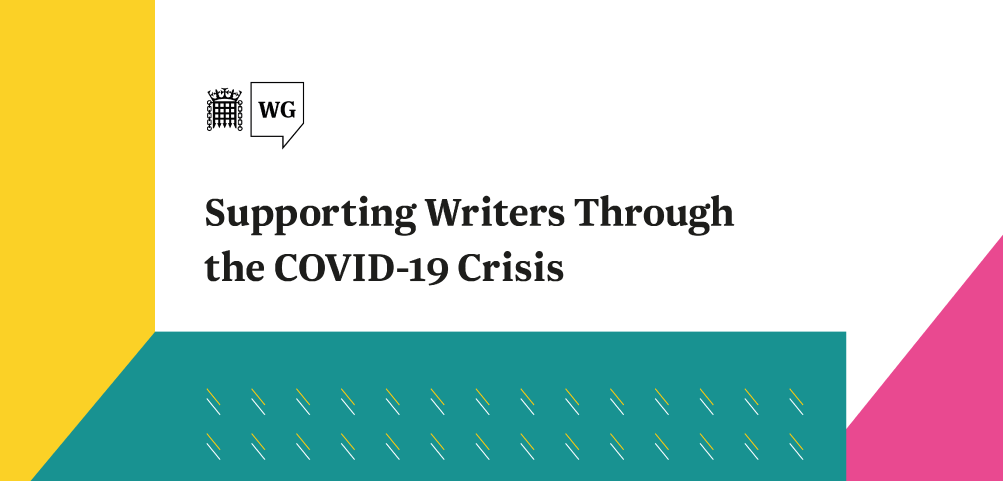Supporting authors and writers through the Covid-19 crisis and beyond

Westminster’s All Party Writers Group sets out the impact of the pandemic on authors’ earnings and proposals for future recovery.
The All Party Parliamentary Writers Group (APWG) has laid bare COVID-19’s devastating impact on the livelihoods of the UK’s authors and writers and, in its latest report published today, has set out a ‘Ten Point Plan’ to help post-pandemic recovery.
The report is the latest call for further targeted support for the country’s fragile creative and cultural sectors beyond the emergency funding so far, and for better engagement by Government with the creative workforce itself, including the vast number of freelancers.
It follows the APWG’s 2018 inquiry into the already parlous state of authors’ earnings. In compiling the report, the Group drew widely on membership surveys and held an inquiry session in November 2020, with witnesses from across the literary sector including authors, playwrights and leading writers’ representatives such as ALCS, the Society of Authors, Writers’ Guild of Great Britain and Association of Authors’ Agents.
The session focused on challenges authors had experienced since the start of the pandemic, including cancelled commissions, loss of personal appearances during lockdown, the closure of high-street bookshops and the gaps in Government support, which failed so many freelancers.
The report puts forward a series of recommendations for the Government to implement, to ensure that writers can feel more secure and supported in carrying on creating works for the British public, and in contributing to the revived success of the UK’s cultural and creative industries.
The recommendations include:
- Establish a ‘Creators Council’, as a clear line of communication between the Government and the creative workforce, including freelancers, to assist policy-making and recovery.
- Fair and modern contract rights for authors in the digital age.
- Protect and promote the UK’s effective copyright system amid online exploitation.
- Secure ongoing targeted support for the creative industries after the pandemic, to help recovery and enable career development.
- Review the gaps in Government support for freelancers, and reform tax and benefit rules.
- Remove VAT on audiobooks to establish a truly level playing field with printed publications.
- Increase funding for the Public Lending Right scheme to reward authors for library book loans.
- Improve access to grants, beyond venues, to better help authors and individual creators.
- Increase opportunity, with more development support for writers beyond London.
- Create a level playing field between high-street and online booksellers, which has become even more unbalanced through the COVID-19 crisis.
Writers are central to the creative economy in the UK, helping to produce the stage plays, television, film and books we all enjoy despite being often overlooked. The recommendations made in the report will also help to address inequalities, exacerbated for writers over the last year.
The APWG heard in the last inquiry that authors’ earnings had declined by 42% from 2005 to 2018 in a survey by ALCS, which helps to support the Group.
Further to this, surveys by the Society of Authors in 2020 discovered that 65% of writers had lost income during the first half of the COVID-19 pandemic, with more losses expected. Testimonies from witnesses, including children’s author Dawn Finch, discussed the impact, explaining that income sources on which many writers rely had simply been wiped out, leaving their future uncertain.
There is also widespread concern that the impact on earnings will further affect diversity within the industry. Writers are typically freelancers, and much-criticised gaps in eligibility for government support, such as the Self-Employment Income Support Scheme (SEISS), have meant large numbers have been unable to access funds to sustain themselves during the pandemic. The same has also happened with grants and loans for individuals, beyond the support focused on venues.
The report follows studies by the Royal Society of Literature and statistics from DCMS that suggest writing as a profession, and the creative industries more broadly, are disproportionately a career path for those who already have independent means.
Poppy Corbett, inquiry witness and playwright, said:
“This is a real issue in terms of inclusion and diversity as, frustratingly, SEISS only applies to authors who can afford to be self-employed full time and who do not need any other supplementary income, so there’s a danger in losing talent forever from the theatre industry.”
On the release of the report, Giles Watling MP, Chair of the All Party Writers Group, commented:
“With this new inquiry, we can see the need to act to support the creative workforce across the country. Throughout the UK, authors have ensured that we have the books, film, television and dramatic works to help us through the pandemic and to support the next generation. We need to make sure that authors are fairly rewarded and can keep doing the fantastic work they do.”
Read the full report here.
About the All Party Parliamentary Writers Group (APWG)
The All Party Parliamentary Writers Group was established in 2007. Its aims are: to represent the interests of all writers, to safeguard their intellectual property rights and to ensure they receive a fair level of recognition and reward for their contribution to the economy and society as a whole. There are currently over 65 members of the cross-party group across both Houses. The Group Officers are: Giles Watling MP (Chair), Pete Wishart MP (Vice-Chair), Lord Clement-Jones (Vice-Chair), Baroness Benjamin (Secretary) and Lord Dubs (Treasurer). The APWG is administered by the Authors’ Licensing & Collecting Society (ALCS).
